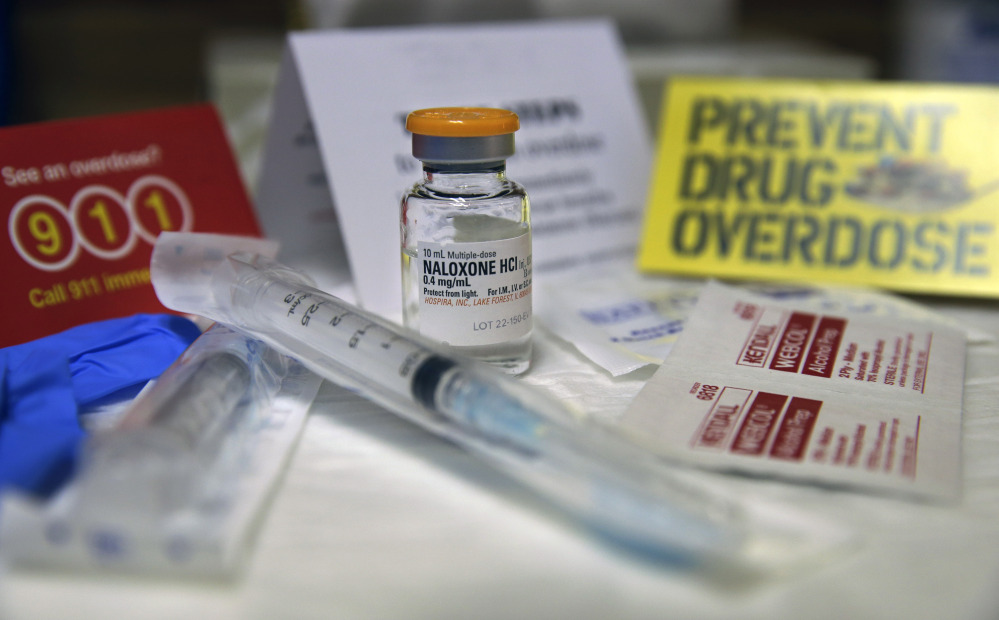AUGUSTA –– Prospects brightened Wednesday for a bill that would give family members of opiate addicts and first responders access to naloxone, a drug that reverses the effects of an opiate overdose.
The Legislature on Wednesday gave final approval to a measure sponsored by Rep. Sara Gideon, D-Freeport, that would join Maine with 21 other states and the District of Columbia in broadening access to naloxone, also known as Narcan. Expanded use of the drug has resulted in more than 10,000 overdose reversals since 2001, according to the U.S. Department of Justice.
The House approved the bill 142-0 and the Senate voted 35-0 Wednesday to send the proposal to Gov. Paul LePage, who has 10 days to sign the bill, veto it or allow it to become law without his signature.
“The momentum behind this bipartisan measure is amazing. We know that putting this proven life-saving medication into the hands of first-responders will make all the difference here in Maine,” Gideon said in a statement. “This devastating public health emergency requires us to take real action.”
Despite broad bipartisan support for Gideon’s proposal, the bill was originally opposed by LePage, who vetoed a similar measure last year because he believed the drug would “make it easier for those with substance abuse problems to push themselves to the edge, or beyond. It provides a false sense of security that abusers are somehow safe from overdose if they have a prescription nearby.”
At a news conference last month, he said, “It’s an escape. It’s an excuse to stay addicted.”
LePage’s opposition eased last week after he struck a deal with Gideon and Rep. Barry Hobbins, D-Saco, to add strict limitations on family members’ access to naloxone. However, on Monday the House unanimously passed a measure that would allow law enforcement and firefighters to administer the drug, and LePage again came out in opposition.
Naloxone is given as a nasal spray that goes directly to the brain, where it binds to opioid receptors to stop the effects of an opiate such as heroin. Overdose victims have one to three hours to receive naloxone to reverse the effects of the opiate.
The bill that cleared the Legislature on Wednesday still contains a provision that would allow law enforcement and firefighters to administer naloxone. However, an amendment approved Wednesday creates uniform training protocols for first responders. The slight revision may be enough to win LePage’s support, according to Sen. James Hamper, R-Oxford. Hamper, who sponsored the amendment, said the governor told him Tuesday that he would now back the bill.
“As of 8:30 a.m. Tuesday he was on board,” said Hamper, adding that the governor’s position is always subject to change.
Officials from the LePage administration did not respond to a request for comment.
The governor’s wavering reflects how isolated he was in his opposition to the bill. House Republicans unanimously backed the bill Monday. Rep. Kenneth Fredette, R-Newport, also called for a roll call vote, a move that made it politically difficult for Republicans to flip their votes to sustain a LePage veto.
Gideon said the Hamper amendment didn’t significantly change the bill that cleared the House.
“There may be an attempt to save face here,” she said.
Many Maine law enforcement officials, including the Maine Sheriffs Association, supported the original proposal. The state Department of Public Safety, which falls under the LePage administration, testified against it.
The resulting law would be more restrictive than similar laws enacted recently in other states. Under the current Maine law, only paramedics among first responders may make the decision to administer naloxone. Advanced emergency medical technicians can do so only with approval from a hospital.
Gideon’s original bill would have further expanded legal possession and use of naloxone by allowing addicts’ family members and homeless shelters to give it to overdose victims, but she narrowed the proposal to gain broader support.
There were 163 overdose deaths last year in Maine. According to the Maine Attorney General’s Office, heroin deaths in Maine quadrupled from 2011 to 2012, from seven to 28. The trend is mirrored nationally. There was a 45 percent increase in heroin overdose deaths from 2006 to 2010, according to the U.S. Department of Justice.
Steve Mistler can be contacted at 791-6345 or at:
smistler@pressherald.com
Twitter: @stevemistler
Send questions/comments to the editors.


